Daily Business Report-May 25, 2016
Ellen Hood is the inaugural director of the Inter-Tribal Resource Center at UC San Diego.
UC San Diego Inter-Tribal Resource
Center Welcomes Inaugural Director
As a college student, Elena Hood knew firsthand the importance of having a place to call home and find familiar faces. In her own experience as an undergraduate, it was her involvement with the Native community that played an integral role in her academic success.
This summer, Hood will begin to cultivate similar opportunities for community growth at UC San Diego as the inaugural director of the Inter-Tribal Resource Center, the campus’ newest space dedicated to inclusion and outreach efforts.
“I want the Inter-Tribal Resource Center at UC San Diego to be a place of belonging,” said Hood. “My goal is to foster a welcoming space for Native populations, including students, staff, families and visitors on campus, provide resources to support academic and professional development, as well as build partnerships with both urban and local tribal communities.”
Hood is an enrolled member of the Absentee Shawnee Tribe of Oklahoma and descendent of the Pauma Band of Luiseño Indians and Choctaw Nation of Oklahoma. For the past nine years, she has served as program manager for The Pechanga School, a tribal school located in Temecula, on the Pechanga Indian Reservation, where she is a resource teacher and develops specialty programs.
Her passion for education and community building began in college. She majored in Native American Studies at UC Berkeley and dedicated her time as a volunteer at the American Indian Child Resource Center in Oakland. She later went on to earn a master’s degree in education at Harvard University and is currently a doctoral student in UC San Diego’s Education Studies Program. For her dissertation, she is investigating what messages and resources Native youth receive from family, schools and community programs as they begin to consider higher education options.
“We are very pleased that Elena will be joining UC San Diego as the inaugural director of the Inter-Tribal Resource Center,” said Becky Petitt, Vice Chancellor for Equity, Diversity and Inclusion (EDI). “She has an in-depth knowledge of best practices to increase access, sense of belonging and success for Native American students. We look forward to her collaborating with campus colleagues in building an inclusive community where our Native American student body can feel welcome and thrive.”
_______________________________________________
North San Diego Business
Chamber Names New Chairman

Keith Wilschetz, director of airport planning and noise mitigation for the San Diego County Regional Airport Authority, has been named board chairman of the North San Diego Business Chamber for the 2016-2017 term.
Charlie Piscitello, senior vice president and chief people officer for Petco, is chair-elect of the organization.
Also elected to the board of directors for 2016-20167 term are:
• Stacey Hrountas, CEO, Sharp Rees-Stealy
• Chris McGlade, site manager, Northrop Grumman
• Denise Visconti, managing partner, Littler Mendelson
• Steve Stallings, council member, Rincon Tribe
• Tom Briggs, partner, Jones Day
• Tim Durie, SVP Human Resources, Newland Communities
Michael Flickinger, general manager, Maderas Golf Club
Harnessing the Vast Array
Of Venoms for Drug Discovery
There are lessons to be learned from venoms.
A team led by scientists at The Scripps Research Institute has invented a method for rapidly identifying venoms that strike a specific target in the body — and optimizing such venoms for therapeutic use.
Scorpions, snakes, snails, frogs and other creatures are thought to produce tens or even hundreds of millions of distinct venoms. These venoms have been honed to strike specific targets in the body.
For victims of a scorpion’s sting, that spells doom. For scientists, however, the potent molecules in venoms hold the potential to be adapted into medicines. But venoms are difficult to isolate and analyze using traditional methods, so only a handful have been turned into drugs.
The researchers demonstrated the new method by using it to identify venoms that block a certain protein on T cells — a protein implicated in multiple sclerosis, rheumatoid arthritis and other inflammatory disorders. The researchers then used their method to find an optimized, long-acting variant of a venom that blocks this protein and showed that the new molecule powerfully reduces inflammation in mice.
“Until now we haven’t had a way to seriously harness venoms’ vast therapeutic potential,” said principal investigator Richard A. Lerner, Lita Annenberg Hazen Professor of Immunochemistry at TSRI.
The report on the advance by Lerner and his colleagues was selected as a “Hot Paper” and cover story by the journal Angewandte Chemie.
San Diegan Appointed to
Delta Stewardship Council

Ken Weinberg, 58, of San Diego, has been appointed to the Delta Stewardship Council by Gov. Jerry Brown. The Delta Stewardship Council was created to achieve the state mandated goals of providing a more reliable water supply for California and protecting, restoring, and enhancing the
California Delta ecosystem.
Weinberg has been an adjunct lecturer at California State University, San Marcos and principal and owner at Ken Weinberg Water Resources Consulting LLC since 2015. He served in several positions at the San Diego County Water Authority from 1991 to 2015, including director of water resources, water resources supervisor and water reclamation supervisor.
Weinberg was a project manager at the city of San Diego Engineering and Development Department from 1987 to 1991. He earned a Master of Public Administration degree from San Diego State University.
The position requires Senate confirmation and the compensation is $43,795. Weinberg is a Democrat.
Water Authority Staff Proposes
Rate Increase for Water Agencies
The San Diego County Water Authority staff has proposed increasing rates charged to member agencies by 6.4 percent for untreated water and 5.9 percent for treated water in calendar year 2017, similar to the increases adopted by the board of directors for 2016.
Next year’s rate proposal is primarily driven by higher costs from the Metropolitan Water District of Southern California. It incorporates higher costs for drought-proof water supplies from the Claude “Bud” Lewis Carlsbad Desalination Plant.
The rates are also impacted by state-mandated reductions in water use that are expected to lower the Water Authority’s sales compared to previous projections.
Careful financial management by the Water Authority has kept the proposed rates near the low end of its projections and well below the double-digit increases during the last drought that were driven by steep price hikes from MWD, officials said.
Proposed 2017 rates will be formally presented to the Water Authority Board on Thursday. The Board will hold a public hearing on the 2017 rates and consider their adoption on June 23.

U.S. Agency Releases Privacy
‘Best Practices’ for Drone Use
The National Telecommunications & Information Administration released a list of voluntary privacy best practices for commercial and non-commercial drone users, in the wake of concerns that drones could encroach on individual privacy and open a new front in the collection of personal data for commercial use.
The privacy guidance, arrived at in consensus with drone organizations and companies like Amazon and Google’s parent Alphabet, recommends that drone operators who collect personal data should have a privacy policy that explains what personally identifiable information they will collect, for what purpose the data is collected and if it will be shared with others, including in response to requests from law enforcement agencies.
The guidelines also encourage drone operators to avoid using or sharing personal data for marketing purposes without consent of the individual.
Qualcomm and Medtronic Collaborate
On Diabetes Monitoring System
Qualcomm Life, a subsidiary of San Diego-based Qualcomm Inc., is collaborating with the Diabetes Group at Medtronic, a leader in diabetes management, to jointly develop Medtronic’s future generation single-use, continuous glucose monitoring systems designed for the type 2 diabetes market.
Despite treatment options available today, more than 50 percent of the 400 million people worldwide with type 2 diabetes do not have proper glucose (blood sugar) control, which can cause long-term complications such as blindness or kidney disease, the companies said in a statement.
Medtronic and Qualcomm Life are addressing this by developing easy-to-use, affordable devices that provide easily accessible information and actionable insights for physicians and patients to improve type 2 diabetes management.
The collaboration with Medtronic will initially focus on developing a lower cost, single-use, professional system with a smaller, tailored design for expanded use by general practitioners who manage care for the vast majority of people with type 2 diabetes. This future generation CGM system will leverage Qualcomm Life’s expertise in disposable, miniaturized wireless components.



